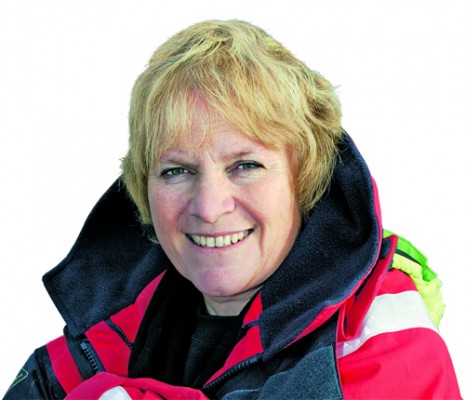Libby Purves: Man overboard drills are important, but it’s a healthy dose of fear that will keep us on the right side of the toerails
“First of all, fear helps. One hand for yourself, one for the ship”
I’m glad to see, among this month’s topics, the rather vital one of how not to fall overboard. We probably don’t talk about this enough, given that it casts a
damper on any merry summer outing to dwell on nightmarish possibilities, and look too suspiciously at the worrying closeness to our comfy cockpit cushions of the churning, chilly, unforgiving sea.
Everyone on an RYA course does man overboard drill, and then – I would guess – memorises the what-to-do list while trying to close their mind to the real and actual possibility of either struggling in the water or – actually worse – seeing a crewmate vanishing astern. We prefer to remember that it was in fact a fender, or a cockpit-cushion, or a rather ludicrous sailing-school dummy called Eric that we hauled unceremoniously aboard with a sharp boathook.
So we have the lifebelts and the clever gizmos to hurl over the stern, and we train the sharper- eyed family members to do the stand-and-point thing. And we hope and assume it won’t happen. But it is fruitful to turn to the earlier question of how not to fall overboard in the first place. And to reflect that actually, it is remarkably unusual for people to fall off yachts: our monkey-instinct to cling on seems to be pretty well honed, although first-time friends always seem utterly horrified by the tippy, slippery, narrow world which we inhabit so very close to the waves.
But the worst is possible. That we must face. So thinking back over small boats and large, old and new, from 21ft butter-dishes to tall ships, and including one traditional 18ft Itchen Ferry with no guardrails whatsoever, these are the ways in which so far none of my entire family and crewlist has fallen overboard. Though there was one boom-swing that sent Paul, harnessless, skittering into the scuppers when I was on the helm in sloppy conditions, and I am not quite over that yet. Now I love my boom-brake, which uses friction to slow the thing down. Even if it did actually break the last boom in the end…
So here’s the lowdown. First of all, fear helps. One hand for yourself, one for the ship, and if necessary forget the ship for a moment and cling on. Make sure the helm shouts ‘Wave coming!’ or ‘Wash coming!’ when someone is pottering about vulnerably up there. Have proper harnesses (with a carabiner that can’t pull open under strain, as many did in the infamous 1979 Fastnet disaster). Use the lifelines along the deck, boring as it is.
Oh, and if you do a lot of standing next to the mast and have room for a mast pulpit – bum-prop to you – go for it. And for heaven’s sake, if you have gone and bought one of those wide, wide boats that feel so comfy in marinas, rig a rope handrail along the cockpit to break your trajectory as you are hurled from one side to the other.
Or put down a batten to brace your feet on. I once fell ten feet across an enormous old Moody and ended up with my legs over the lee side.
For children, we preferred harnesses to netting, which can feel deceptively safe. But having said that, on board the tall ships (notably my beloved Europa), bad weather warnings are always followed by the installation of tall, over-adult height nets all along the rail, sweetly entitled ‘crew-strainers’.
But most of all, it’s about attitude. The thing that has really kept me on the right side of the toerail all these years is accepting that I am not a balance artiste. When going for’ard to sort something out, I should not attempt to spring around in a nimble boyish manner, running up and down the side-deck with showy agility. No! When in doubt, crouch. When in a lot of doubt, crawl.
Even if you’re wearing a harness. You will look a bit ridiculous, distinctly cowardly perhaps in the presence of more gung-ho shipmates,
but there is nothing more safe and cosy than keeping a nice low centre of gravity. OK, I look like a giant mummy turtle creeping out of the sea to lay eggs. But I crawl back safely…
Libby Purves




